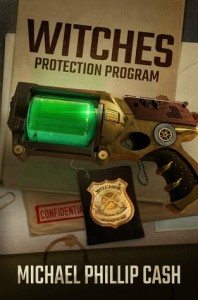
Michael Philip Cash
2015
Reviewed by Michael Collings
From its assertion in the punning title and the early revelation that the main character suffers from dyslexia, Michael Phillip Cash’s Witches Protection Program asserts itself as a self-consciously oxymoronic, purposefully self-contradictory entity: a horror jeu d’esprit, a play of wit that develops through and depends upon juxtaposing the tropes of horror with clichés (verbal and narrative), commonplaces, and the unexpected expected.
Its plot touches upon the burlesque, the ancient literary art of treating great things as trivial, or trivial things as great. In this case, the standard villain’s quest of world domination hinges upon…a women’s cosmetic cream, subtly altered by introducing bits of an evil witch’s DNA that will enable her to control women everywhere, leading to a world in which men are secondary and subservient. Against her machinations stand two representatives of the WPP: an older, wiser, almost all-knowing Mentor figure; and a young, muscled, handsome, manly he-man with the manly he-man name of Wes Rockville. Caught in the middle is the beautiful young niece/ward of the villain, who is instantly attracted to the younger man, and he to her.
If all of this sounds a bit trite, it is. Designedly so. The basic narrative functions as a backdrop for wordplay and situational comedy, as when characters are attacked by hordes of magically animated gummy animals and the ensuing battle is treated with all of the solemnity and seriousness and bloodshed—or rather, candy-syrup-shed—of a classical epic. Or in another episode, characters seeking to enter a secret warehouse are transformed into frogs and simply hop their way inside, only to be confronted by—the horror!—a cat, and their desperate struggle for survival is resolved through a literary deus ex machine that is at once appropriate and highly comical.
Witches Protection Program is a quick, entertaining read. Its closest parallels might be the comic-horror novels of Jeff Strand, in which traditionally horrific elements are often treated as every-day and commonplace, and the resulting dissociation of traditional responses—shudder!, shiver!, tremble!—and the uncertain but simultaneously hearty laughter that replaces them becomes part of the fun.








